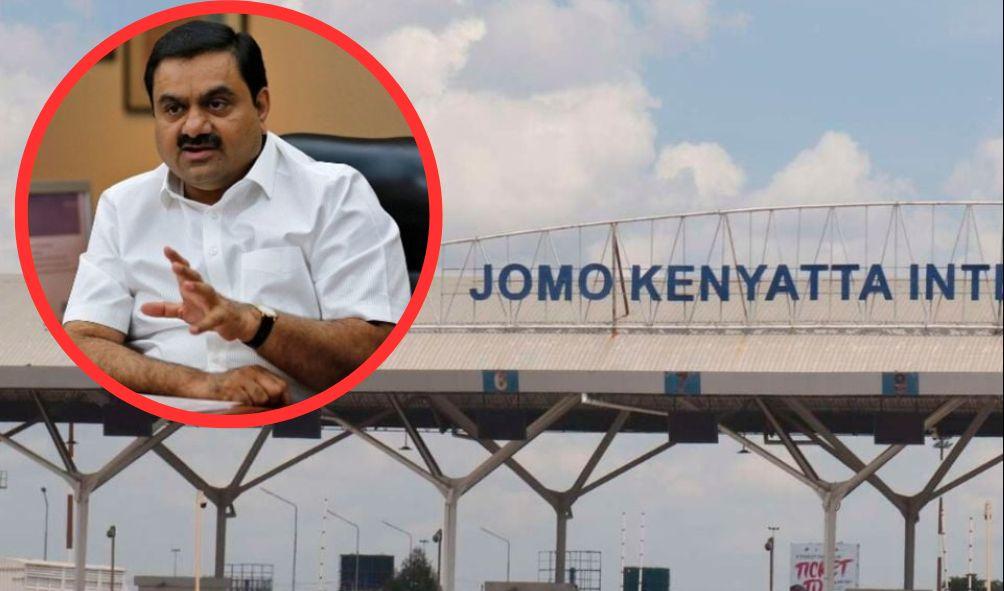Adani’s JKIA Takeover Sparks Controversy: Rising Anti-India Sentiment and Diplomatic Tensions
Rising concerns about the potential acquisition of Jomo Kenyatta International Airport (JKIA) by India’s Adani Group are fueling anxieties about escalating anti-India sentiment in Kenya, as the proposal encounters opposition on both sides of the Indian Ocean.
The ongoing discussions, which have already led to protests in Kenya, are now being associated with increasing unrest in India, where opposition leaders warn that the situation could develop into a diplomatic crisis.
This development coincides with a 16-member Kenyan delegation arriving in Mumbai earlier this week to review the Ksh246 billion investment proposal from the Adani Group, which aims to revamp JKIA’s aging infrastructure. The Kenyan officials’ visit is a crucial step towards finalizing the agreement, anticipated to be concluded by November.
Under the proposal, Adani seeks a 30-year exclusive concession at JKIA, including a clause barring the Kenyan government from building another airport during this time. Additionally, Adani wants control over upgrades at Kenya’s 38 airports, tax exemptions, authority over airport fees, and significant influence over airport personnel decisions.
In India, the proposal is being examined not only for its business impact but also for potential geopolitical repercussions. Jairam Ramesh, a senior leader of the Indian National Congress, has warned that the protests in Kenya against Adani Group’s involvement might escalate into broader anti-India sentiment.
ALSO READ:
- Ruto Holds Virtual Meeting With Uhuru, 3 Other Ex-African Presidents
- Kenya: Rape Suspect Caught Stealing Prosecutor’s Phone at Kibera Court
- Trans Nzoia Governor George Natembeya Faces Scrutiny Over Suspicious Withdrawal of Millions
- Murkomen Under Fire Over Remarks on Gen Z Mental Health, Forced to Apologize
- Donald Trump Appoints Daughter’s Father-in-Law, Massad Boulos, as Senior Advisor for Africa
“The proposed acquisition of Nairobi airport by Adani Group has triggered widespread protests in Kenya. This poses a serious concern for India,” Ramesh stated on Tuesday, September 3. “These protests could easily evolve into broader anger towards India and the Indian Government, particularly given the close relationship between Adani and our Prime Minister.”
Ramesh’s warning underscores the delicate balance India must strike while expanding its economic influence in Africa, avoiding backlash against Indian interests abroad. He highlighted similar controversies involving Adani projects in Sri Lanka and Bangladesh, which have also led to unrest and harmed India’s reputation in those countries.
“Recent controversies involving Adani Group projects in Sri Lanka and Bangladesh have undermined our national interests. The ongoing protests in Kenya risk becoming another chapter in this troubling trend,” Ramesh added.
In Kenya, tensions persist as the Kenya Aviation Workers Union (KAWU) continues to oppose the Adani takeover. Representing around 10,000 workers, the union has threatened to strike, accusing the Kenyan government of secretly attempting to privatize the airport.
“The government lacks transparency in this proposal. We view it as a covert attempt to privatize a national asset without adequate stakeholder engagement,” said a KAWU representative. “We support modernization, but it should not come at the expense of Kenyan jobs and national sovereignty.”
KAWU had initially planned a walkout on August 19 but postponed the strike after receiving promises of negotiations. Despite the delay, union leaders remain firm in their stance until their concerns are addressed.
The Kenyan government, however, defends the proposal, arguing that JKIA’s outdated infrastructure urgently needs upgrading. Officials state that the necessary investment for the airport’s overhaul exceeds state funding capabilities, making private sector involvement crucial.
ALSO READ: JKIA-Adani Deal: 16 Top State Officials Head to India for Critical ‘Due Diligence’ Mission
“The investment required to upgrade JKIA to international standards is significant. We lack the financial resources to do this on our own,” said a senior official from the Kenya Airports Authority (KAA). “Partnering with a private entity like Adani is essential to ensure the airport’s competitiveness in the region.”
Despite these reassurances, the proposal’s opponents remain skeptical, and the deadline approaches. With both sides standing firm, the situation seems set for a potentially significant confrontation.
As negotiations progress, the Indian government is likely to face growing pressure to reconsider its role in the project. Ramesh’s comments suggest that Adani Group’s ambitions in Kenya could become a flashpoint in India’s domestic politics, especially given the strong ties between the company and Prime Minister Narendra Modi.
“India’s soft power has been a cornerstone of our foreign policy. Today, this strength is at risk due to the government’s connection with Adani,” Ramesh stated. “This represents an unprecedented failure for India on the global stage, with potentially severe consequences.”
Adani’s JKIA Takeover Sparks Controversy: Rising Anti-India Sentiment and Diplomatic Tensions
